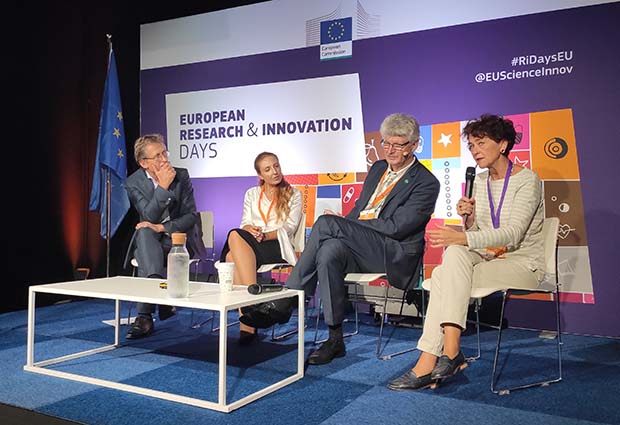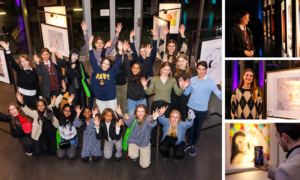
European Research and Innovation Days
EMBL plays a role in shaping the future of research and innovation policy in Europe

A diverse group of European policymakers and other experts gathered in Brussels from 24–26 September for the first annual European Research and Innovation Days. The aim of this policy conference – organised by the European Commission – was to co-create Horizon Europe: Europe’s next framework programme for funding research and innovation.
In the panel session ‘Let’s speak about Europe’s scientific excellence’, EMBL Director General Edith Heard discussed EMBL’s successes under the Excellent Science pillar (Pillar I) of the current framework programme, Horizon 2020. The majority of the EU grants awarded to EMBL are under this pillar, and Heard emphasised that European Research Council grants – for which excellence is the primary criterion – are at the core of cutting-edge research in Europe. This in turn leads to practical applications that benefit society, such as developing improved drugs for cancer therapy.
Heard also spoke about the importance of research infrastructures – the resources, services and facilities that underpin innovation in science. In particular, she highlighted the value of the data resources hosted at EMBL’s European Bioinformatics Institute (EMBL-EBI), and discoveries in structural biology made possible by the powerful X-rays produced in the synchrotrons at EMBL’s sites in Hamburg and Grenoble.
What’s on the horizon?
Looking to the future, and Horizon Europe, Heard explained that finding synergies between the Excellent Science pillar and the Global Challenges pillar (Pillar II) could lead to solutions to some of the key challenges faced by society, including in the area of climate change and antimicrobial resistance, where molecular biology can play a role in helping us understand the effects of the environment on biodiversity. She also focused on the increasing relevance of molecular biology in clinical research – where molecular data plays a vital role in drug development, among other areas – and pointed out the increasing overlap between fundamental and applied research.
Citizen science was another hot topic for discussion, as Horizon Europe will aim to strengthen cooperation between science and society. Heard drew attention to EMBL’s work with the Tara Ocean Foundation, and the many public engagement and outreach activities organised around Tara’s Mission Microplastics, which has been underway since May.
Widening research excellence
Jana Pavlic, EMBL Joint Head of Government and EU Relations, was on the panel of speakers for the session ‘Bridging, widening, sharing: let’s advance Europe together’. The focus of the discussion was on the Horizon 2020 Widening instruments. Here she explains what widening means in this context, and looks ahead to Horizon Europe.

What is the purpose of the Widening instruments?
Widening refers to widening research excellence across Europe, but primarily from countries that are more advanced in research to those still in the process of building their research excellence. The Widening instruments aim to close this divide through transfer of knowledge, institution building, and conveying good practices in research. In our case, it’s about working together with EMBL’s newest member states, and their communities in Central and Eastern European countries and the Baltic states.
What was your role in the panel discussion?
I was asked to give the perspective of the advanced partner in projects EMBL has participated in under the Widening instruments. In these projects we are the more experienced institute, and we are sharing our knowledge.
What were the key points of your talk?
I discussed how EMBL has joined forces with a consortium of Hungarian partners to establish the Hungarian Centre of Excellence for Molecular Medicine. The most valuable aspect of this project is institution-building. This involves strategic, long-term thinking, and it’s essential to have the management on board in all the partner institutions. I gave some examples of what’s working well. First, we carefully built the internal structure to ensure autonomy of research and decision making. Second, we put in place the process for international recruitment for key positions at this new research centre – and we are already seeing expats returning to Hungary to take up positions there, which is great. And third, by establishing this as an EMBL Partnership, we brought the new institute into a community of research leaders with a strong focus on molecular medicine.
Did you learn anything interesting from the other speakers in your session?
Two of the other speakers were from countries on the receiving end of Widening projects, and both mentioned the key point of institution-building and the involvement of management. This institutional aspect was something we all agreed on. The management of both partners – whether on the receiving or the advising end – need to approach this as a strategic project.
What can we expect from Horizon Europe?
There is a proposal to double the budget for Widening measures in Horizon Europe compared to Horizon 2020 – this is very welcome. We’re already thinking about future projects with partners from Widening countries. We’re also hoping that the Excellent Science pillar and links to the Global Challenges pillar will continue to be strongly supported, which in turn will further support EMBL in carrying out research in some of the new directions we’re exploring currently.


